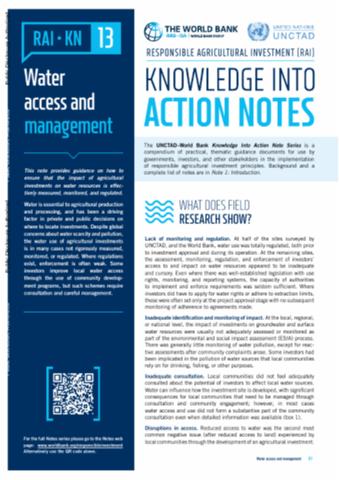A framework for coupling land use and hydrological modelling for management of ecosystem services
It is well known that land-use changes influence the hydrological cycle and that those changes in the hydrological cycle influence land use. The sophisticated spatial dynamic planning tools that have been developed in the last decades to support policy makers in the decision making process do not take into account the mutual feedbacks between land use and hydrology.
13th International Scientific Conference ''Students on Their Way to Science'': (undergraduate, graduate, post-graduate students): collection of abstracts, April 20, 2018 (Electronic resource)
The conference is aimed at dissemination of scientific research results, sharing of experience, improvement of foreign language and cross - cultural communication skills, and establishing of international contacts.
Agricultural production forecasting using planning distribution model (PDM): A case study of the Nam Oon Project
For forecasting agricultural production to design cropping patterns and to utilize water effectively, a computerized agricultural production monitoring system named PDM was selected. The Nam Oon irrigation project was chosen as a case study. PDM was used for agricultural production forecasting in the Nam Oon project for ten cultivation seasons from the 1995 wet season to the 2000 dry season. The factors affecting flow in the canal and the agricultural production forecasting equation were also investigated.
Inter-sectoral water allocation: A case study in upper Bagmati Basin
13 - Water Access and Management - Responsible Agricultural Investment (RAI): Knowledge into Action Notes series
This note is part of an Action Notes series and provides guidance for governments and companies on how to ensure that the impact of agricultural investments on water resources is effectively measured, monitored, and regulated.
Agro-climatic and hydrological characterization of selected watersheds in northern Ghana
A regional scale ecological risk framework for environmental flow evaluations
Recent developments in Environmental Flow (E-flow) frameworks advocate holistic, regional scale, probabilistic E-flow assessments that consider flow and non-flow drivers of change in socio-ecological context as best practice. Regional Scale ecological risk assessments of multiple sources, stressors and diverse ecosystems that address multiple social and ecological endpoints, have been undertaken internationally at different spatial scales using the relative-risk model since the mid 1990's.
Quantum geographic information system training and development of digital diagnostic atlas: intervention for analysis and planning of Murgab River Basin, Turkmenistan. [Final Project Report of the Transboundary Water Management in Central Asia]
Assessment of rain water harvesting potential for supplementary irrigation in Lume district, East Shoa
Collective action in the irrigation sector of Uzbekistan: a case study of water consumers associations (WCAs) in the Karshi Steppe
Climate change adaptation through the water-energy-food nexus in southern Africa
Climate change is a complex and cross-cutting problem that needs an integrated and transformative systems approach to respond to the challenge. Current sectoral approaches to climate change adaptation initiatives often create imbalances and retard sustainable development. Regional and international literature on climate change adaptation opportunities and challenges applicable to southern Africa from a water-energy-food (WEF) nexus perspective was reviewed.



